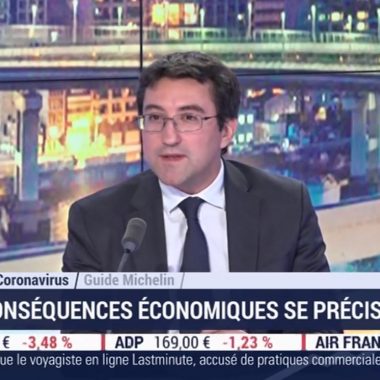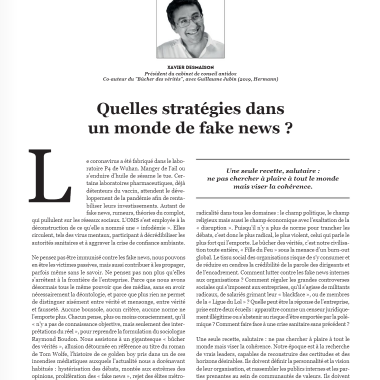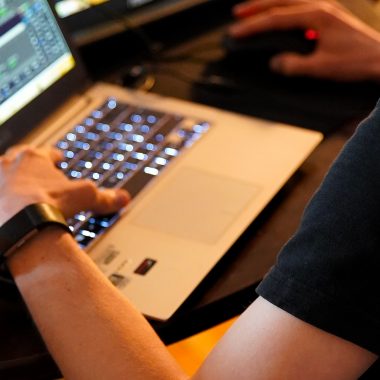There’s a murmur you’ll hear just about everywhere in tech circles… Is tech – as developed over the last few decades – really beneficial? Do we still believe, as Tim Cook claimed in 2014, that Steve Jobs “has made the world a better place”?
On a more practical level, has it contributed to a greater or lesser extent to the fight against the pandemic which has shaken our societies’ economies? To some extent yes: no serious lockdown strategy could have really been designed and practised without it, without collaborative resources, without the “cloud”, the video platforms, e-commerce and video games… Lockdown really was its time to shine. And this is a good thing for those who reason that this is a good strategy. But has the legendary artificial intelligence helped us in our underlying fight against Covid-19? Overall… No. These are the findings of Marc Andreessen, who manages a16z, one of Silicon Valley’s main venture capital funds. He argues that tech has created nothing of fundamental value when faced with Covid-19. At the very most, it has brought about changes in business models, i.e., new ways of generating money from traditional activities. “We chose not to *build*”.
Is the situation better in the world of information, knowledge and what is today, referred to as the virtual world? Invited to appear this week before the American Senate, Mark Zuckerberg (Facebook), Sundar Pichai (Google) and Jack Dorsey (Twitter) sought with great difficulty to deflect criticism from their communication platforms, which are accused of amplifying political manipulation, conspiracy theories and negative emotions such as anger and hatred as well as infringing everyone’s privacy. The fact nevertheless remains that on 29 October a former Malaysian Prime Minister was able to post on Twitter that Muslims are entitled to kill millions of French citizens without his message being clearly condemned by the platform. The debate around the freedom of expression, privacy and state control over information circulating on these platforms is a complex one and must be approached with caution over the coming months and years but we can safely say that to date, the tech sector’s track record concerning the capacity to circulate knowledge, facilitate high quality content between individuals and cultures and to improve each person’s cognitive capacity is a contrasting one. On the Netflix platform, the recent documentary The Social Dilemma “explores the dangerous impacts social networks have, from our psychological health through to elections”. This highly topical “hybrid documentary-drama” focuses on the addictions we can all develop to our digital resources (mobile telephones, social networks, etc.) and the way big tech manipulates its users to harvest valuable personal data.
It’s in this context that in a few days we will be publishing an essay via Hermann, intended to analyse all of these issues and the way Europe and France can build higher value tech businesses over the years to come. Entitled “Junk Tech, comment la Silicon Valley a gagné la guerre du marketing” (“Junk Tech, how Silicon Valley won the marketing war”), it results from discussions between Jean-Marc Bally, the manager of Aster, one of the main European venture capital funds, and myself. “Junk tech”, is considered in the same light as “junk food”, this addictive, appealing, inexpensive but tasty food which has contributed to a major obesity epidemic.
The first point noted is that Silicon Valley’s success is not fundamentally a question of technology but of marketing. Thanks to the researcher Mariana Mazzucato, we all know that Apple is not a technical success but one based on design (the R&D was carried out by U.S. public agencies). Marc Andreessen, who’s mentioned further up, put it mawkishly. The European Union boasts major research and development capacities. Michel de Lempdes, the manager of Omnes Venture Capital, another major French venture capital company announced a few days ago that he was raising funds for his “deep tech” fund, to finance a type of company founded on groundbreaking technology and not just changes in business models. These groundbreaking technological developments in the space, biotech, cybersecurity and materials sectors are made possible through a combination of advances in the fields of physics, chemistry and digital technology. Investment capacities are still insufficient, but there’s no doubt that Michel is showing us a way forward.
The second point is that Silicon Valley has succeeded in largely convincing us that its success stems from technical superiority. And many European and American managers – including some of the best in the world – have fallen for this hook, line and sinker, to their detriment. They have been convinced that it was necessary to increase investments in data, in “artificial intelligence” and holdings in start-up companies, all actions which are certainly praiseworthy but which overlook the fact that the key lies in the effective integration of technologies in what we call “marketing”. Here, that refers to habits, simplicity, ego enhancement and pleasure. Investments in “sovereign cloud” formats have not found an eager audience at this stage as they do not provide users with the comfort, simplicity and flexibility provided by the Californian solutions.
The third point noted is that this habit-driven marketing (and ultimately addiction) can be used to develop services generating social value. Frédéric Mazzella, the founder of BlaBla Car and joint president of France Digitale has noted that some of the leading French start-ups are advocating a “third way” between the United States and China, between productivism and malthusianism, thanks to algorithms and digital interaction platforms. Blabla Car makes it possible to avoid a level of CO2 emissions equivalent to those of the city of Paris. Too Good to Go offers traders the possibility to circulate promotions for their almost-out-of-date food products. Approximately 8% of annual CO2 emissions are believed to be generated by dumped products. These technologies can be used by start-ups (Phénix) and by associations such as the “Agence du don en nature” which makes it impossible to redistribute unsold goods rather than destroy them. Edouard Dumortier, the manager of Allo Voisins, the leading French platform for exchanging goods and services, has also noted in a book published by Hermann that the collaborative economy “has the benefit of limiting hyper-consumption while at the same time making it possible to continue consuming in an economical, responsible and sustainable manner”.
All of this is the responsibility of the European states. Frédéric Mazzella also notes that “in the United States, of the 200 largest beneficiaries of public orders, almost 90% are American companies. We need to ensure that in Europe we are not naïve and left behind in this global race. In addition to economic patriotism, there’s also a need for European digital patriotism”.
By Xavier Desmaison, CEO of Antidox









